Articles
- Page Path
- HOME > J Korean Acad Nurs > Volume 42(6); 2012 > Article
-
Original Article
- Effects of Individualized Nutritional Education Programs on the Level of Nutrient Intake and Nutritional Status of Colorectal Cancer Patients Undergoing Palliative Chemotherapy
- Kwi Ock Park, Smi Choi-Kwon
-
Journal of Korean Academy of Nursing 2012;42(6):799-809.
DOI: https://doi.org/10.4040/jkan.2012.42.6.799
Published online: December 31, 2012
1Center for Cancer Education and Information, Seoul National University Hospital, Seoul, Korea.
2College of Nursing, Seoul National University, The Research Institute of Nursing Science, Seoul, Korea.
- Address reprint requests to: Choi-Kwon, Smi. College of Nursing, The Research Institute of Nursing Science, Seoul National University, 103 Daehak-ro, Jongno-gu, Seoul 110-799, Korea. Tel: +82-2-740-8830, Fax: +82-2-765-4103, smi@snu.ac.kr
© 2012 Korean Society of Nursing Science
- 1,159 Views
- 22 Download
- 6 Crossref
Abstract
-
Purpose
- The purpose of this study was to examine the effects of an individualized nutritional education programs on nutrient intake and nutritional status of patients with colorectal cancer who are undergoing palliative chemotherapy.
-
Methods
- Forty patients with colorectal cancer (19 experimental and 21 control patients) were recruited from a chemotherapy ward at S University Hospital in Seoul, Korea. The experimental group received two individualized nutritional counseling sessions and two telephone counseling sessions over 6 weeks. The control group received nutritional counseling after completion of data collection. Nutritional education included general guidelines for food intake while receiving chemotherapy, dietary guidelines for patients with colorectal cancer, daily meal schedules to overcome cancer, and dietary guideline for each chemotherapy side effect. Data were analyzed using χ2-test and t-test with the SPSS program 17.0.
-
Results
- Two group comparison revealed that the experimental group had significantly improved calorie (p=.038) and total protein intake (p=.001), and serum albumin percentage change (p=.040). Body weight did not increase but remained the same as the baseline in both groups.
-
Conclusion
- Study results indicate that this individualized nutritional education programs are effective in enhancing nutrient intake and nutritional status of patients with colorectal cancer who are undergoing palliative chemotherapy.
This article is an addition based on the first author's master's thesis from Seoul National University.
- 1. Cho G, Paik HY, Park MS, Lee EK. Effects of nutrition counseling on diet and nutritional status of cancer patients on radiotherapy. Korean J Nutr. 2000;33:193–201.
- 2. Choi JH, Lim EY, Kwon YH, Park SY, Choi YH, Lee YM. Dish doctor for colon cancer patient. 2008;Seoul, Daga.
- 3. Do MH, Lee SS, Jung PJ, Lee MH. The effect of individual nutrition counseling on diet and nutrition status of postoperative breast cancer patients. Korean J Nutr. 2004;37:557–565.
- 4. Finley RS, Balmer C. Concepts in oncology therapeutics. 1998;2nd ed. Bethesda, MD, ASHP Publications Production Center.
- 5. Jun MH, Kim MJ, Choi KS, Kim DH. The effect factors of quality of life on patients undergoing chemotherapy after stomach cancer surgery. J Korean Oncol Nurs. 2002;2:83–93.
- 6. Kim AS, Lee ES, Kim SH. Effects of telephone intervention as supportive nursing on self-care practices and quality of life for gynecological cancer patients under chemotherapy. J Korean Acad Nurs. 2007;37:744–753.ArticlePDF
- 7. Kim IK. The use of the functional food in elderly patients with digestive tract cancer. 2009;Seoul, Ewha Womans University. Unpublished master's thesis.
- 8. Kim PJ. Sumptuous feast for cancer treatment. 2008;Seoul, Woonjin Living House.
- 9. Kim YH. Clinical nutritional guideline for health care providers. 2000;Seoul, Asan Medical Center Nutrition Team.
- 10. Kim YS. Presentation of good sales practice from analysis of the distribution structures of health functional foods market. 2010;Chungwon-gun, Korea Food & Drug Administration.
- 11. Korea National Statistical Office. Death and the cause of death statistics. 2010;Daejeon, Author.
- 12. Korea Society for the Study of Obesity. Diagnosis of obesity. 2009;Seoul, Author.
- 13. Korean Nutrition Society. Korea dietary reference intakes for Koreans. 2010;Seoul, Korean Nutrition Society.
- 14. Lee GS. Two out of every 10 cancer patents, "death by malnutrition". 2006;07 12 Retrieved March 29, 2012. from http://media.daum.net/culture/others/view.html?cateid=1026&newsid=20060712181515675&p=kukminilbo.
- 15. Malone PE. Implementation of a prechemotherapy educational intervention. Clin J Oncol Nurs. 2007;11:707–710. http://dx.doi.org/doi:10.1188/07.CJON.707-710.ArticlePubMed
- 16. National Cancer Institute. Chemotherapy and you. 2007;Bethesda, MD, National Cancer Institute.
- 17. Nitenberg G, Raynard B. Nutritional support of the cancer patient: Issues and dilemmas. Crit Rev Oncol Hematol. 2000;34(3):137–168. http://dx.doi.org/doi:10.1016/S1040-8428(00)00048-2.ArticlePubMed
- 18. Noh EJ, Seo SM, Kim SK, Kim YS. A study for dietary factors related in colon cancer occur. 1999;In: Nutrition Research and Practice: Spring-Autumn Conference; 654–655.
- 19. Oh BJ. General oncology nursing. 2005;Seoul, Shin-kwang Press.
- 20. Ottery FD. Definition of standardized nutritional assessment and interventional pathways in oncology. Nutrition. 1996;12:1 Suppl. S15–S19.ArticlePubMed
- 21. Ovesen L, Allingstrup L, Hannibal J, Mortensen EL, Hansen OP. Effect of dietary counseling on food intake, body weight, response rate, survival and quality of life in cancer patients undergoing chemotherapy: A prospective, randomized study. J Clin Oncol. 1993;11:2043–2049.ArticlePubMed
- 22. Park JH. Recent advances of palliative chemotherapy in advanced colorectal cancer. Korean J Med. 2009;77:18–25.
- 23. Perron M, Endres J. Knowledge, attitudes, and dietary practices of female athletes. J Am Diet Assoc. 1985;85:573–576.ArticlePubMed
- 24. Senesse P, Assenat E, Schneider S, Chargari C, Magné N, Azria D, et al. Nutritional support during oncologic treatment of patients with gastrointestinal cancer: Who could benefit? Cancer Treat Rev. 2008;34:568–575. http://dx.doi.org/10.1016/j.ctrv.2008.03.003.ArticlePubMed
- 25. Seoul National University Hospital. The chemotherapy for cancer patients: please check it out. 2008;Seoul, Seoul National University Hospital.
- 26. Shim YM. A study on nutrition in elderly hemodialysis patients. 2003;Seoul, Seoul National University. Unpublished master's thesis.
- 27. Wie KA. Prevalence and risk factors of malnutrition according to tumor location and stage in cancer patients. 2005;Seoul, Seoul National University. Unpublished master's thesis.
- 28. Yang YH. The comparison of the perceived needs between patients with cancer, their caregivers, and nurses according to the cancer patient's phases of illness. J Nurs Acad Soc. 1997;27:787–795.ArticlePDF
- 29. Yang YH, Lee DS. The relationship of anorexia, nausea, vomiting, oral intake and nutritional status in patients receiving chemotherapy. J Korean Acad Nurs. 2000;30:720–730.ArticlePDF
REFERENCES
Figure & Data
REFERENCES
Citations

- Effectiveness of the nutrition referral system in a multidisciplinary pancreatic cancer clinic
Sydnee C. Wong, Abhinav V. Reddy, Amy Hacker-Prietz, Laura Kress, Priya Pathak, Colin S. Hill, Timothy A. Lin, Joseph M. Herman, Jin He, Lei Zheng, Mary-Eve Brown, Amol K. Narang
Supportive Care in Cancer.2023;[Epub] CrossRef - Effects of Continuous Nutrition Care on Nutritional Status and Dietary Habits of Patients With Colorectal Cancer Receiving Adjuvant Chemotherapy After Surgery
Jina Son, Ha I Kang, Eun young Jung, Hae won Ryu, Kyung-Ha Lee
Clinical Nutrition Research.2023; 12(2): 99. CrossRef - Empowering patient education on self-care activity among patients with colorectal cancer – a research protocol for a randomised trial
Leena Tuominen, Marita Ritmala-Castrén, Pia Nikander, Siru Mäkelä, Tero Vahlberg, Helena Leino-Kilpi
BMC Nursing.2021;[Epub] CrossRef - Dietary advice with or without oral nutritional supplements for disease-related malnutrition in adults
Christine Baldwin, Marian AE de van der Schueren, Hinke M Kruizenga, Christine Elizabeth Weekes
Cochrane Database of Systematic Reviews.2021;[Epub] CrossRef - Trends in Nursing Research on Cancer Patients Nutrition in Korea
Su-Ol Kim
Asian Oncology Nursing.2016; 16(1): 1. CrossRef - Nutritional Intervention Using Nutrition Care Process in a Malnourished Patient with Chemotherapy Side Effects
Hye-Ok Lee, Jung-Joo Lee
Clinical Nutrition Research.2015; 4(1): 63. CrossRef
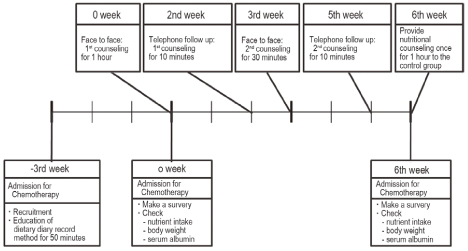
Figure 1
Individualized Nutritional Education Programs
General and Nutritional Characteristics of Participants (N=40)
Exp.=Experimental group; Cont.=Control group; FOLFOX=Oxaliplantin+Leucovorin+5-Fluorouracil; FOLFIRI=Irinotecan+Leucovorin+5-Fluorouracil.
Comparison of Nutrient Intake and Nutritional Status between the Groups (N=40)
Exp.=Experimental group; Cont.=Control group; DRICP (%)=Dietary reference intakes for cancer patient.
Analysis of Nutrient Intakes in the Experimental and Control Groups (N=40)
Exp.=Experimental group; Cont.=Control group; FDOTE=Fat distribution of total energy.
Exp.=Experimental group; Cont.=Control group; FOLFOX=Oxaliplantin+Leucovorin+5-Fluorouracil; FOLFIRI=Irinotecan+Leucovorin+5-Fluorouracil.
Exp.=Experimental group; Cont.=Control group; DRICP (%)=Dietary reference intakes for cancer patient.
Exp.=Experimental group; Cont.=Control group; FDOTE=Fat distribution of total energy.
 KSNS
KSNS
 E-SUBMISSION
E-SUBMISSION

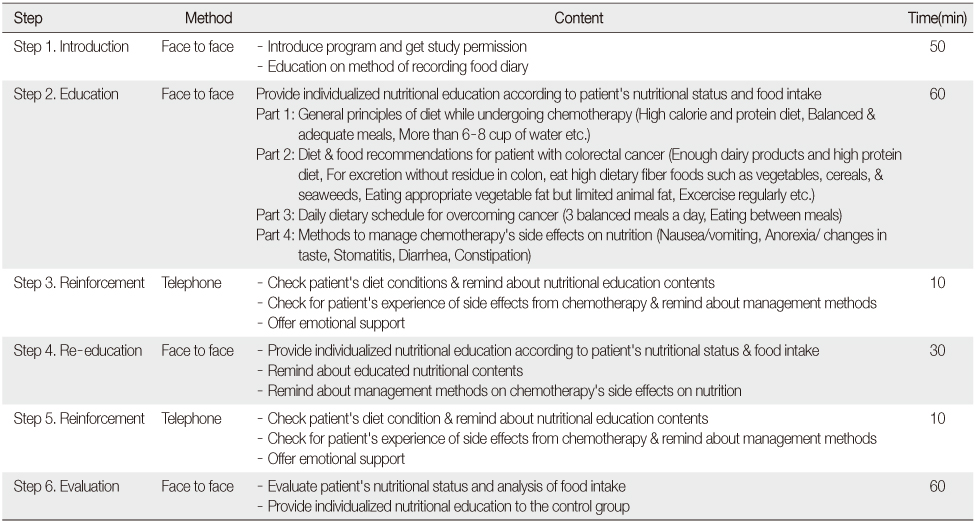
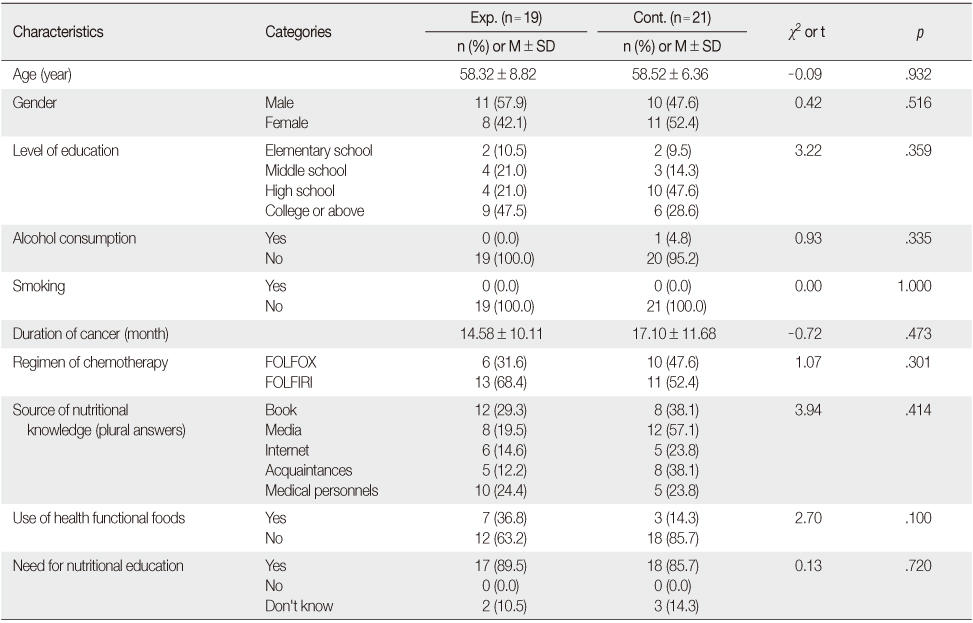
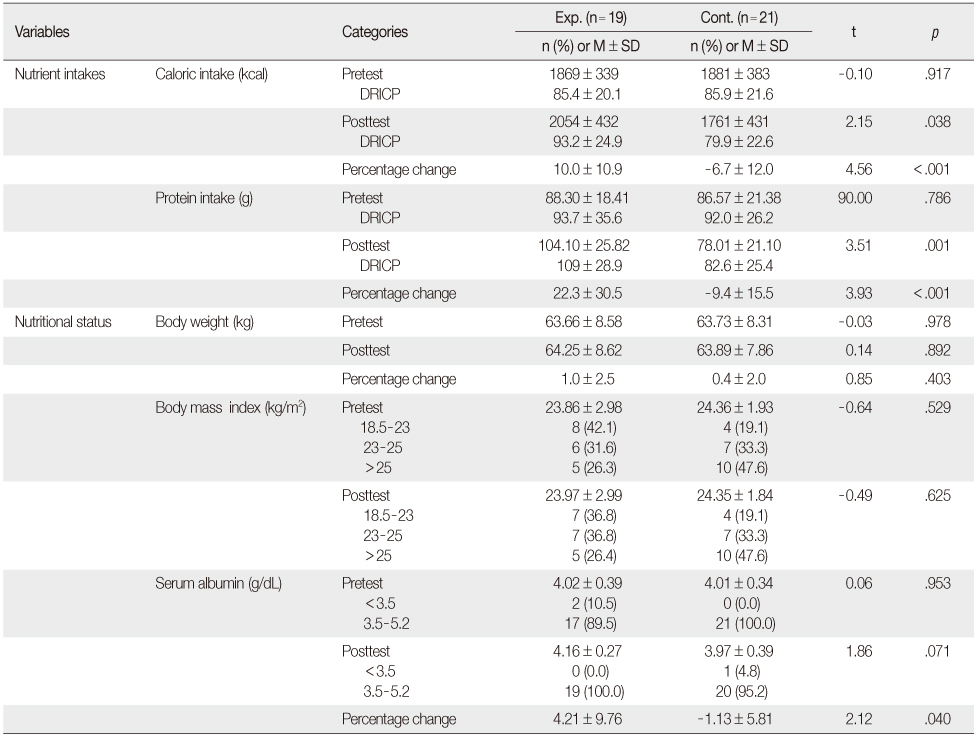
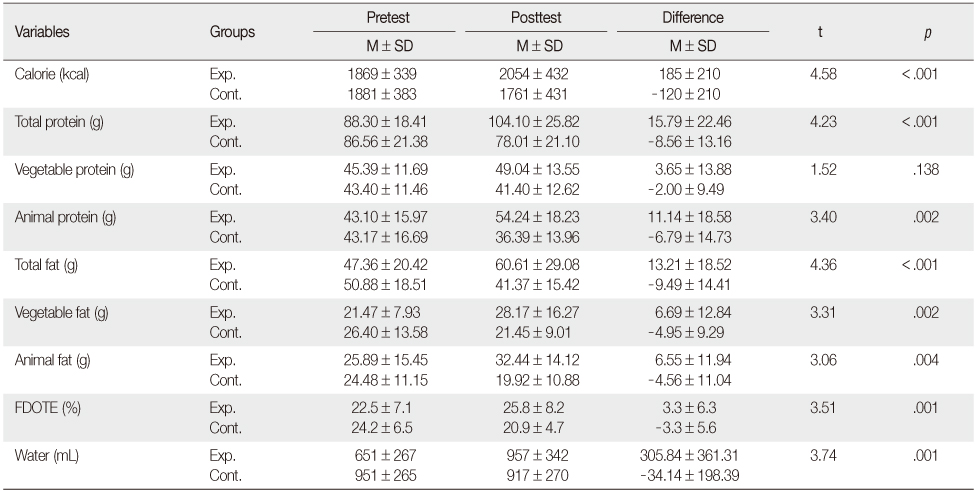
 Cite
Cite

